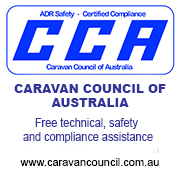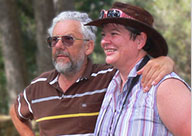|
|
|||||||||
|
Caravanning News is registered with the National Library of Australia's PANDORA archive |
|||||||||
|
August 2014 |
|||||||||
|
|
Caravan parks 'boring places' The joy of staying in RV-friendly towns SEMI-RETIRED information technology lecturer Phil Jones dismisses any claims that free-camping travellers do not support towns. The caravanner-turned motorhomer admits he shies away from caravan parks, claiming: "They are boring places and do not provide anything for us." He and partner Alayne Russell much prefer free-camping, spending the money saved on supporting local businesses. They travel the eastern states taking modified college courses to outback communities as instructional workshops. Mr Jones has penned the following story outlining the joy of staying in an RV-friendly town.
Grey nomads' self-contained meanderings across outback WE are on our annual grey nomad meanderings across outback areas of northern New South Wales and Queensland. We enjoy this part of the country for many reasons – probably the greatest being the ability of staying anywhere it suits us as a result of our motorhome being classed as 'self-contained'.
We have solar panels on the roof providing lots of 12volt
power to almost everything inside the vehicle; gas for heating and
cooking and hot water; a very comfortable shower/toilet, with
enough fresh water on board for about five days of activity, and like most
other travellers we have internet coverage for most of the time via either Telstra
and/or Optus.
The family caravans I had
many years ago were quite primitive when compared with many of today's
'vans. It has been a delightful journey so far.
From here we continue across
central Queensland through Longreach to Emerald, then south until we get
into NSW and the ACT to catch up with family. So we've still got several
months of travel before us before we get home in mid-October. We also have had a week in Cloncurry, with several days in Julia Creek and now Richmond. In doing so, we have enjoyed their hospitality with their RV Friendly overnighting areas as well.
Normanton's RV freedom camping area is a rough piece of ground on the northern side of the Norman River ... an area that gets flooded each wet season and consequently has no services on site. This requires every vehicle staying overnight to be fully self-contained with toilet and water supply.
There also is a limit of 10 vehicles a night, with a council
ranger checking at sundown to ensure each camper has the camping
permit visible on the dashboard. The mix of caravans to motorhomes was
about half-and-half. While the maximum number of vehicles is not stipulated, there is a council rule that all vehicles must be self-contained, and the camp hosts send all small rental 'whiz-bangs' and battered station wagons which arrive intending to stay overnight to the local caravan park. There is fresh water on tap as well.
Julia Creek's dump point
is attached to the council depot in town. At Julia Creek's RV area,
the mix of caravans to motorhomes was about two to three caravans. The town's information centre issues permits to travellers who are in self-contained vehicles and visitors can stay for up to three days. The council has planted small trees across the most flattish area in the reserve, creating 'sites' of about 8m x 12m in size.
Last night there were about 15 visitors, tonight there are about 10 ... and
again about a
half-and-half mix of caravans and motorhomes.
For me as a
non-sporting person it was as exciting as watching paint dry, but we went
along as we had been invited and we joined with the several hundred locals
and visitors to watch the game. The visitors went home victorious.
For accommodation, we try
to overnight in council-run showgrounds, RV overnighting places or
sometimes farm stays. As we do not hook up to 240volt power, a powered site is useless to us. Also, we have a perfectly good shower and toilet, so we don't need to walk across a cold and windy park to have a pee or a wash. It comes down to "we do not use caravan parks – they are boring places to stay at and do not provide anything for us". To conclude: For those readers who are thinking of travelling Australia please make a start and do so ... it is a great place to travel with plenty of places to go and things to see. We are on the road for about eight to nine months each year and love it. It's a highly recommended relaxed and inexpensive lifestyle that suits our retirement pension. BACK TO CARAVANNING NEWS MAIN PAGE
SEND YOUR COMMENTS OR No part of this
publication may be reproduced or transmitted without Copyright 2005
Dennis Amor |
 |
|||||||
|
|
|||||||||





